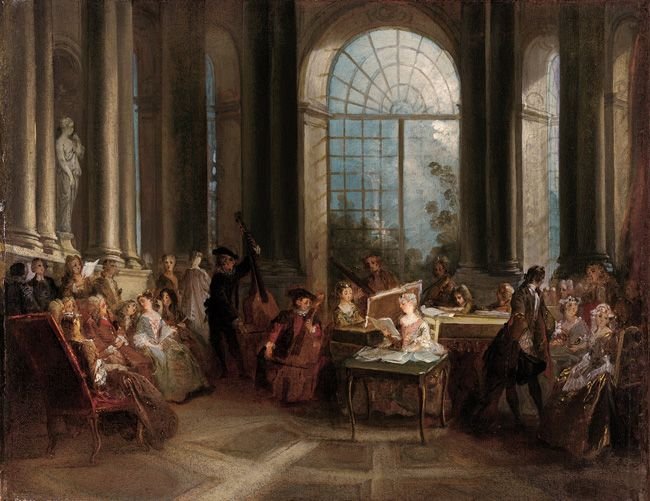From the Salon to the Scaffold
A program for Bastille Day
Saturday, July 13 at 6:00 PM
Maverick
120 Maverick Road
Woodstock, NY 12498
THE ARTISTS
Pascale Beaudin, soprano
Charles Brink, flute
Olivier Brault, violin
Scott Pauley, lute
Andrew Appel, harpsichord
THE PROGRAM
J. M. Leclair
Deuxieme Recréation, Opus 8
Nightingales in love
Jean-Phillippe Rameau
Viens Hymen
Jean-Baptiste Bousset
Pourquoy doux Rossignol
Francois Couperin
Le Rossignol en amour
J. Ph. Rameau
Rossignols amoureux
J. Ph. Rameau
Pieces de Clavecin in E
Jean-Paul-Égide Martini
Plaisirs d’Amour
Songs of Revolution
Francois Devienne
Trio in G minor, Opus 66 #2
To the Four Nations Ensemble’s great delight, our performance on the eve of Bastille Day will be accompanied by crickets, bull frogs, and night birds. This natural orchestra just outside of Maverick’s concert shed has inspired much of our program and reminds us that the French love evocation. Central in our concert is a set devoted to the nightingale either witnessing love or suffering from it.
For the Baroque composer (and painter), pure nature was a starting point, and at times a frightful one. Nature, central to all creativity, was to be organized and improved. One look at the gardens of Versailles or Vaux le Vicomte illustrate this. Plants and flowers left to their own devices were confused, unruly, discourteous. They were to be organized in an understandable series of patterns allowing the promenade to offer beauty but not confusions. Getting lost in a garden was little short of a nightmare. While the Romantic might flourish in a world of surprise, Couperin and Rameau translated natural song into comprehensible melody. Our Sweet Nightingales speak our language and because of this, appeal to our hearts on solid grounds.
Chardin - The Bird-Song Organ or Lady Varying Her Amusements, about 1751
Abstract music, with origins in Italy and triumphs in Germany, was not the material of the French. “Sonata, what do you mean?” was the battle cry of the French in resisting the influences of Rome and Venice. Jean-Marie Leclair, the greatest violinist of France, a virtuoso to match and exceed in power and imagination any violinist-composer before or after his time, seems to capture the strength of pure music while using dance and dramatic rhetoric in each movement. In his Second Recréation, a masterpiece of what is known as fete galante style, he evokes the countryside and the city, the opera house in his overture, the seduction scene in a badinage, and finally the grand ballet in a masterful chaconne worthy of comparison to Bach’s great violin work. Leclair’s music offers grandeur, wit, raucous pleasure and profound expression.
Both Rameau and Leclair were masters of sensual seduction. Both spent time in Paris and in the countryside and their music marries the ultimate in sophistication with spontaneous, wooden shoe country song and dance. Both of them understood how to translate the French language into French melody. Leclair danced and Rameau wrote the finest dance music until Tchaikovsky creating images of exquisite body motion with his expressive and often surprising modern harmonies. We might smile as we remember that neither of them were easy, sweet men! Leclair never ceases to remind us in his prefaces to his published works that we, as performers and listeners are unworthy. It is said that Rameau, on his death bed asked the priest singing last rites to…stop!
The years leading to the Revolution bring a new mind, a new society, and a new music to Paris. The sonata begins to appeal to the French audience. The more natural English garden replaces the traceries of Versailles, the businessman surpasses in wealth and power the aristocrat, and a dynamic society replaces the debonair. Musically, the poetic stasis of Couperin and Rameau is rejected in favor of foreign influences. Mozart’s g minor tempestuousness invades and conquers the concert hall. Devienne, the first teacher of flute at the new and revolutionary conservatory, brings a darkness and instability that is as far away from Couperin’s nightingale as the explosive crowds demanding a new society are from the friends of Louis XIV and Madame de Maintenon, so comfortable in their music salon loving their privilege and fearing nothing more than…change!



